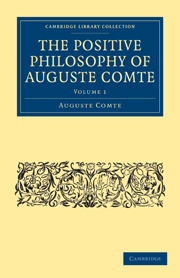CHAPTER III - GENERAL VIEW OF GEOMETRY
Published online by Cambridge University Press: 29 August 2010
Summary
Its nature
We have seen that Geometry is a true natural science;—Only more simple, and therefore more perfect than any other. We must not suppose that, because it admits the application of mathematical analysis, it is therefore a purely logical science, independent of observation. Every body studied by geometers presents some primitive phenomena which, not being discoverable by reasoning, must be due to observation alone.
The scientific eminence of Geometry arises from the extreme generality and simplicity of its phenomena. If all the parts of the universe were regarded as immovable, geometry would still exist; whereas, for the phenomena of Mechanics, motion is required. Thus Geometry is the more general of the two. It is also the more simple, for its phenomena are independent of those of Mechanics, while mechanical phenomena are always complicated with those of geometry. The same is true in the comparison of abstract thermology with geometry. For these reasons, geometry holds the first place under the head of Concrete Mathematics.
Definition
Instead of adopting the inadequate ordinary account of Geometry, that it is the science of extension, I am disposed to give, as a general description of it, that it is the science of the measurement of extension. Even this does not include all the operations of geometry, for there are many investigations which do not appear to have for their object the measurement of extension.
- Type
- Chapter
- Information
- The Positive Philosophy of Auguste Comte , pp. 86 - 105Publisher: Cambridge University PressPrint publication year: 2009First published in: 1853



